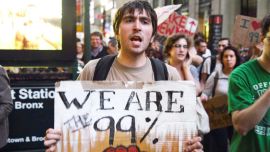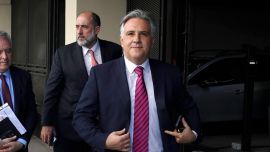Axel Kicillof is the governor of Argentina’s most-populous region, Buenos Aires Province.
A former economy minister under ex-president Cristina Fernández de Kirchner, Kicillof spoke to Jorge Fontevecchia in an interview broadcast last weekend, just days after the province paid US$250 million to creditors, who had refused to accept a delay to a key bond payment.
NUMBER-CRUNCHING
Let’s begin by running through some controversial numbers. Starting with the debt of Buenos Aires Province: US$9.3 billion in 2015 and US$11.3 billion in 2019 – an increase of 21 percent.
You must bear one thing in mind – the 2015 exchange rate for the dollar was 9.50 pesos as against 63 today. And I also wish to remind you that the Province collects its revenues in pesos, not dollars. Running up dollar debt has generated this problem. But yes, I agree with that figure.
Debt not recognised by the Province in 2015 and not recognised or accrued and unpaid in 2019 as against, independently of the debt issued, this other debt which was also around.
Floating debt, as it’s called, the unpaid bills at the end of a term.
In 2015, the debts to Bapro [Banco de la Provincia de Buenos Aires] were registered. A bond of US$600 million was then issued and another bond with suppliers to which should be added further debts with IOMA [Instituto de Obra Médico Asistencial, which basically looks after the health care of provincial employees] and with IPSE [mental health institute], plus four months’ arrears in transfers to municipalities, totalling US$1.8 billion. Can we at least agree on those figures?
I’m not so clear about that…
When you took over, you found unpaid debts running to 41 billion pesos.
No, it was more like 70 billion [pesos].
Or more or less US$1.1 billion at the current exchange rate.
More or less.
Let’s move onto debt as a percentage of GDP. In 2015, it was six percent whereas today it’s almost nine, or 8.9 percent to be exact. If we take what Hernán Lacunza [ex-minister at both national and provincial level] said, it’s almost half the US$26 billion owed by all the provinces.
Of which US$11 billion corresponds to this province.
Representing 41 percent whereas the Province collects 37 percent.
But only 23 percent of the federal revenue-sharing. We must be making everybody dizzy with so many numbers.
It seems important to me to agree over the figures so, to continue, the per capita debt in the Province is US$600.
I don’t have that figure on me but yes.
Well, let’s see if this information is correct – the debt issued by the Daniel Scioli government was, on average, due in three-and-a-half years, and that issued between 2015 and 2019 in five years, so they’re all falling due together.
It’s exactly the other way round. The 2015 debt had five years and some grace period on average and now three years and a half. That is why 94 percent of the debt issued by María Eugenia Vidal falls due in the next four years – i.e. on the government following her.
A third of that total falls due this year. The concentration is very great.
Of course, US$3 billion, more or less.
Since the previous administration could not issue new debt after early 2018, all falling due in five years, three are left because two have already passed. Let’s add an important point: dollar debt was 60 percent of the Daniel Scioli administration’s total whereas Vidal left 80 percent of the debt in dollars.
The figures are 57 percent before and 82 percent now.
The conclusion is that dollar debt increased considerably. Debt was 47 percent of provincial revenues in 2015 and 67 percent today. Let’s take investment in public works: US$3 billion in 2011 to 2015 and US$6 billion during the Vidal government.
I’m not granting you that number. Those were agreements. I have to go over the exact figures but it’s not like you say. There was a lot of debt and many promises but nothing was done. Even if I’ve still got to go over the numbers, I’d tell you no.
According to sources, 3.7 percent of Scioli’s budgets were public works and six percentunder Vidal.
That’s not true either. In the last two years all public works were suspended.
That’s right. In 2017, it was 7.5 percent and then it fell off a lot in 2018 and 2019.
Conceded then.
Is it correct to say that public assets have grown via the debt issued, plus the public works? That would be applying private enterprise criteria to the public sector.
It’s not like that. No way. In fact, an important part of floating debt has to do with works left half-done and with no new estimates. Today they constitute a debt, plus the need to see how much they’re going to cost. What is clear – and nobody misses this point – is that they cut everything in 2018. Quite apart from the initial thrust when they ran up debt and promised things, they left everything half-done.
The 2019 budget was a trillion pesos and this year’s is estimated to be 1.5 trillion. The debt paid in January was US$250 million and 15 billion pesos, or one percent of your budget. The total falling due this year is 15 percent of your budget or 220 billion [pesos].
Correct.
Let’s turn to the tax burden, which the previous administration lowered. Was it five percent of provincial gross product in 2015 and four percent now?
It didgo down a bit. With my tax law, which has now been approved, the tax burden has fallen.
The Greater Buenos Aires Compensation Fund would be non-existent if it had not been updated but is now 120 billion pesos.
120 billion? I think it’s more like 100 billion. There was a signed agreement to transfer 44 billion to the previous government but at the end of its term it was amended by 20 billion. An issue that was badly resolved because Vidal promised until her last day that Macri would transfer her the money. And that did not happen, I don’t whether within the framework of some tussle or simply in the context of non-compliance all along the line. The Greater Buenos Aires Compensation Fund has its handicaps but the figure is around 100 billion.
A figure which Scioli did not have, for example.
During the government of Cristina and Scioli, I was economy minister. In that period there was a whole bunch of programmes between different ministries and city halls or provinces – some in kind, others in services, others via subsidies from the national government and others via economic transfers. All that was cut during the government of Mauricio Macri. In overall terms, the national government did not give any money beyond federal revenuesharing. Beforehand, the Province received federal revenuesharing and other programmes and funds as well.
So you’re saying that Scioli received those 100 billion but in another form?
A whole lot more. Via public works but also paying his transport subsidies. The Macri government passed onto Vidal a ton of expenses while taking away many funds related to the programmes of different ministries. To spell it out clearly, it took away medicine and computers for the kids.
So in balance the Province lost out.
It lost out hugely. That’s what I worked on in the campaign. They said: “We got more money” but they got more money in automatic funding while Buenos Aires Province lost programmes it had beforehand. Macri practically shut down his ministries while passing on tons of expenses. It was ruinous for Buenos Aires Province and you can see that in all the problems there were with school infrastructure, the lack of vaccine and public works, which was also money which the national government gave the province before and now was lacking.
You might ask why that money never reached provincial coffers. And the answer is that beforehand there were national programmes nationwide. If, say, the Health Ministry decided to do a national programme, 40 percent would be for Buenos Aires Province. That’s where Macri’s austerity hit all policies, leaving the Province dying of hunger and thirst.
DEBT PAYMENTS
Knowing the outcome, would you have done everything the same with that US$250-million debt?
Yes and I’ll explain why. For days and days they accused me of being irrational and heading towards an unnecessary and inopportune default. When it was avoided, they accused me of paying up no matter what. I don’t complain or criticise those analysts. But it seems to me that whatever we did would have been analysed as being wrong.
A tough negotiating stance is bad and a weak one too. Everybody has the right to criticise, to express their ideas but objectivity ends beyond the figures. We need to explain the situation a bit more. As your figures correctly state, the Province has to pay 220 billion pesos this year in debt falling due. Can it? No, not within its budget because it’s almost 15 percent of the budget and no less than almost 60 percent goes to pay salaries. Then there is another 20 percent transferred to municipalities.
Automatic transfers. That still leaves 20 percent.
That 20 percent is needed to pay some public works, fill some holes in the road. If that 15 percent goes on debt, you cannot buy a pencil or do anything. Vidal and Macri placed Argentina a n d the Province so massively into debt that its service has exploded with regard to the budget.
The budget we have, especially in the framework of recession during three of the four years of the previous government, makes the debt what we call unsustainable. We cannot meet it with these funds. Enormous sums are falling due at both provincial and national level, and even more if you don’t grow and generate foreign currency. One thing is linked to the other. If you use the budget to pay debt, you cannot do anything else.
But couldn’t you say that no province or state in the world pays its debt, which is always renewed?
That’s the other issue. A few days ago we could see a video of Macri which became relatively famous, not so much as it ought to have been because it is a kind of self-criticism by the ex-president. I don’t think it was a leak. What he said shocked me, you might call it a 'sincericide.'
Many of those who supported him and continue to support what was done with the debt in the previous government act as if the problem were ours falling from heaven, as if I’d run it up in 50 days of government. How did I find what Macri describes? He affirms that he told his officials: “You take and take debt until one day they cut you off. Be careful with that.” I don’t know how an ex-president can say: “I told you ...”. Told whom? If he was the president, the responsibility was his.
It was very unfortunate.
But very sincere and not denied by himself or anybody from his group. What he recognises is that they grabbed any debt coming their way irresponsibly. Macri knew that it was going to end, that the tap would be turned off. He himself said that he was avoiding the problem and afterwards recognised that everything would go to hell when they stopped lending.
So the credit was cut off long before Kirchnerismo became an alternative.
That had nothing to do with the change of government. I agree with what the ex-president said and also repudiate it. If he knew, he shouldn’t have done it, it was irresponsible. If his role was limited to saying: “Watch out,” he wasn’t being president.
Macri has a lot to explain and I would like him to do so because we all suffer the problem and the disaster, not just me as provincial governor. When they stopped lending to Argentina and shut down the market, Macri went running to the International Monetary Fund, which wasn’t a good solution either because the IMF has a tragic history in Argentina. I saw that video several times because it seemed to me a tragic confession … that two-minute snippet demolishes all the rhetorical paraphernalia and propaganda.
Did you co-ordinate strategy with the national government [on the payment]?
Everything. Alberto said so too. We talked all the time with Martín [Guzmán] and with Alberto, this payment was very uncomfortable because to set conditions for a debt you need laws and a dialogue with the bondholders, which takes time. Whether to pay or not is related to the general renegotiations. We were trying to reach May, which would have corresponded.
Did events in the Province generate any cost for national debt?
The worst thing that could have happened is the Province paying up without protest.
So what was done ended up being beneficial for debt negotiations?
It was inscribed within a strategy in the context of a very sensitive and delicate situation. It does not all come out like a Hollywood film with immaculate hairdos and applause. There has to be a process. Martín Guzmán co-ordinated with the Province, to which should be added the issue being handled by the president both in and outside the country during our joint trip to Israel. A high degree of coordination handling very difficult situations.
Was it a laboratory test for the national debt, to see if a fund which was not supposed to be trouble turned aggressive?
It was a very rapid process. I would have liked to have had more time. If it fell through, there was no turning back. They also said that the debt came from a bond of a previous government. The problem I have this year is that two-thirds of this unsustainable debt was taken by the previous administration. What makes the debt unsustainable is not a single payment but the volume.
That’s clear.
But there’s subterfuge. Some have tried to drive home a wedge with this. The local press has the right to say what they want but when it was Macri running up the debts, many people did not say anything. When they closed down the markets against us, they applauded that we went to the IMF. That’s not a críticism – perhaps they believe it and they think it’s great. But it exploded as it exploded and ended in disaster.
What is the ideal scenario for provincial negotiations? A haircut, new deadlines, something to do with interest rates?
It’s very difficult for the Province to obtain special conditions.
Something better than the nation?
When a nation takes on debt, it obtains better conditions because it has bigger financial backing, it has a Central Bank with reserves. When a debt is renegotiated, provinces are supposed to adopt national criteria. But in some way we’re all in the same boat.
What would be a good negotiation?
Anything sustainable, according to different parameters. As Martín Guzmán explains, if you have an enormous debt but can count on the international markets to refinance it, it’s sustainable. You don’t pay it, you refinance it. Today, Argentina has no possibility to refinance dollar-denominated capital on the international market.
How do you see the March 31 deadline? You have payments also to make in April.
Alberto has a timetable with deadlines. The dialogue with bondholders began in December. At that moment we opened an email inbox. Everybody asked why. It’s the creation of a formal channel to talk with this tool – there is an official inbox so that if a bondholder wants to make a proposal, they can. Bondholders came to see me during the campaign. They all had proposals. The discussion began a while ago.
Do you have anything further to say on this topic?
That the people of Buenos Aires Province be assured that we will do the impossible to reach the best possible settlement which does not prevent us from doing what we have to do. That implies returning to growth and creating jobs and we’re already doing that.
RELATIONSHIPS
Off-camera you told me that your governance is invisible in the media, which only talk about the debt.
I don’t complain, I’ve been in public life for 10 years and I’m accustomed to it. There are some mass circulation dailies in Argentina with a dominant position in which there has never been a single paragraph praising anything I did in all that time. That’s OK, I don’t care, it’s their right.
Is the press harder on you than on other Kirchnerites?
I have no way of measuring that.
Is it harder on your provincial government than the national government?
Cannot say either. Governing is very demanding and there are various thermometers. One thing is what the media say, another thing the social networks, another what happens in the street, another what your aides and ministers tell you. The Province has 850,000 public employees.
Do you feel that they criticise you more than anybody else?
More than Cristina?
Immediately after Cristina.
About Máximo [Kirchner] they said that the only thing he knew was PlayStation. Which is disproved by listening to his speeches as caucus leader.
As a specialist in communication I believe that the worst sin is to be boring. Even when they criticise you, there is evidently something in your personality which attracts the audience, even to críticise.
Unfortunately [Laughs].
They don’t criticise uninteresting people.
I’m nice to criticise.
How’s your relationship with Sergio Massa and his people?
Excellent. I had no relationship [with him] previously. Our first conversation was at the time of the vote on the Law of Historic Reparation [for pensions], which was the law of historic destruction, along with whitewashing for the president’s brother.
And with Massa's people?
Excellent too. Ours is a heterodox and heterogeneous front, which nobody imagined was going to work so well. They’re out to get us all the time. They say we fight but no: those are fine points. Argentina is in an economic, social and historic emergency and crisis. The political forces forming the front face it with maturity and generosity starting with Cristina’s step, which for me was very bold, unexpected and tremendously effective.
When she named Alberto Fernández...
And herself as vice-president. A gesture of infinite generosity. It is understood that we are in a crisis from which we have to emerge with robust politics, not confrontations, by postponing personal ambitions.
A classic sociological principle is that groups bond in the face of external danger. Cracks in such a heterogeneous front are probable. Will it remain united once the crisis is overcome?
Peronism has had periods of great cohesion and others of dispersion. It’s a movement containing internal differences, which I call shades because we are all part of the national, popular and democratic field. But we’re taking a liking to unity. Dispersion caused us serious electoral problems. I don’t think we’ll repeat the same mistakes.
Even if successful.
The government before Macri, that of Néstor and Cristina, was the longest in history, three consecutive democratic terms while a fourth term lost out by 1.5 percent in the runoff. They say that Macri ‘ended his government well’ but he lost in the first round and is the only Latin American government and in the history of Argentine democracy not to clinch re-election. The most logical thing would have been for him to be re-elected in the first round. And everybody said that if he did lose in the first round, he’d win the runoff for sure. But it was not like that.
Attempting hegemony can lead to divisions. Do you think that you can reproduce that or is it a lesson learned forever?
Hegemony is a word which sounds bad to me. We learned that division favoured Macri. I said so in the campaign. Unity is something which has to be watered every day. It does not consist of three leaders getting together. It implies a lot of work, talks, sacrifices and the search for agreements. It seems to me in this sense that we are setting an example for everybody.
























Comments